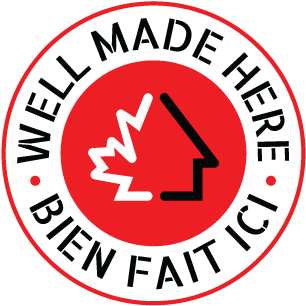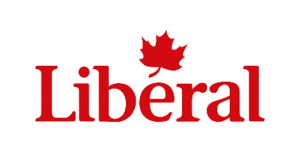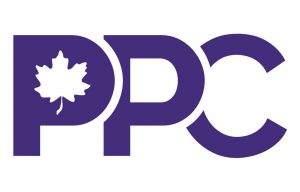Election: the importance parties place on Canadian building materials
There are only three days left before voters decide which party will form the next government and which will form the opposition in Parliament in Ottawa. “Well Made Here” wanted to know the stance of the contending parties with regard to the issues our organization is tackling.

Here are the subjects that were submitted for their consideration:
- Repatriate the production of certain key components to secure the supply chains of manufacturers operating in Canada
- Encourage consumers to choose products that are truly “Made in Canada”
- Further favour domestic suppliers for their own sourcing
The order of the responses follows the number of seats each party held at the dissolution of the House of Commons. Although the People’s Party of Canada, led by Maxime Bernier, did not have any members elected, it still provided a response which we are sharing with you.
(Note: click on party logos to view their full electoral platform)
The repatriation of production of certain key components to secure the supply chains of manufacturers operating in Canada
The pandemic has also highlighted the importance of resilience in supply chains, rather than just efficiency. Canadian companies, with access to a diversity of raw materials and a talented workforce, manufacture some of the highest quality construction products in the world. We want more to be produced in Canada, in a cleaner way, to meet the market demands of today and tomorrow. As such, we have invested $ 8 billion to support the green transition of our industries, including mining, aluminum and steel, securing their future in Canada for decades to come. This is just the beginning. We will need more of these products to implement our plan to create or renovate 1.4 million homes. The plan includes $ 4 billion to speed up construction of 100,000 new homes for the middle class, $ 2.7 billion to build and repair affordable housing and an additional $ 1.2 billion to convert empty offices into housing, while introducing a new tax credit for renovating multigenerational homes.
To encourage consumers to choose products that are truly “Made in Canada”
To meet our carbon neutral target by 2050, we need to renovate almost every building in Canada. This is the perfect opportunity to kickstart a vibrant renovation economy. A Liberal government will create a Low-Carbon Building Materials Innovation Hub to work directly with building contractors, municipalities, provinces and territories, and Indigenous governments to ensure that Canadian innovations are better positioned for success. We will also invest in transforming the forest industry, working with partners to create jobs in the forest economy and deliver innovations in sustainable, low-carbon building materials.
The federal government also plays a key role in facilitating interprovincial trade. In order to support a robust and rapid recovery, Canada must be able to mitigate capacity constraints, bottlenecks and inefficiencies in its transportation infrastructure. The 2021 budget provides for an investment of $ 1.9 billion over 4 years to recapitalize the National Trade Corridors Fund. This will support businesses in all of our supply chains and boost the potential of small and medium-sized businesses in all regions, including rural and remote communities.
To further favour domestic suppliers in your own sourcing
Considering that the federal government is one of the biggest buyers in Canada, the government’s procurement policy is a fundamental lever in helping our businesses here to grow in the Canadian market. Over the past year, our government worked tirelessly to ensure that all Canadian businesses that could do so were able to contribute to the fight against COVID-19. Together, we built a plan for businesses here to support Canada’s frontline medical workers. We are putting the full weight of the federal government behind a plan to recalibrate industrial policy and supply chains. We worked in collaboration with more than 6,500 companies who came together to offer their capacity and expertise. By working together, we have been able to find innovative solutions to use the capabilities we have here in Canada to meet critical needs. What this pandemic has shown us is that we can use that same energy to continue supporting businesses here.
Landon Wilcock, Senior Policy Advisor
Liberal Party of Canada
The COVID-19 pandemic has demonstrated the importance of having strong, stable supply chains. Our reliance on everything from personal protective equipment (PPE) to vaccines has demonstrated our reliance on outside exports for items that could easily be made here in Canada. When we outsource jobs, particularly to countries we can’t rely on in an emergency, we put the health and safety of Canadians at risk.
Canada’s Conservatives believe we should have more “Made in Canada” and less “Made in China” when it comes to strengthening and supporting our manufacturing sector. We want to keep manufacturing dollars here in Canada, decrease our reliance on imports, and ensure we have a stable supply chain in case of emergency. This will include the creation of a strategy to repatriate and diversify supply chains, specifically moving them away from China.
Canada’s Conservatives will only pursue free trade agreements with free countries that respect workers’ rights and maintain high environmental standards. We will put a strong focus on bringing manufacturing of critical equipment back to Canada by ensuring that government and government-funded procurement of these essential products favours Canadian producers. We will work to rebuild our domestic vaccine manufacturing capacity. We will also dramatically revise supply chain legislation to meaningfully enforce Canada’s commitment not to import products known to be made with slave labour and immediately ban imports of products made with enslaved Uyghur labour.
To support Canadian manufacturing, we must ensure we are the most tax-competitive jurisdiction for innovation. Through Canada’s Recovery Plan, we will make Canada a low tax jurisdiction for innovation and new product development by introducing a “patent box” regime to cut the tax rate in half on income earned from patents on innovative products developed here. Recognizing the importance of protecting more Canadian innovation with patents, Canada’s Conservatives will cover up to $10,000 of the administrative and legal costs of each of the first five patents filed by any Canadian small or medium-sized business.
Conservatives understand the importance of a “Made in Canada” strategy and will endeavour to make it a reality. Products made for Canadians, by Canadians, will be effective in driving our economy post-pandemic and beyond.
The Honourable Erin O’Toole
Leader of Canada’s Conservatives
The repatriation of production of certain key components to secure the supply chains of manufacturers operating in Canada
The economic nationalism of the Bloc attaches great importance to redeveloping our industrial fabric.
COVID has exposed the fragility of globalized supply chains. We are still living the effects today: superconductor supply difficulties, outbreaks forcing factories in Asia to close, container shortages, the Chinese port of Yantian closed. The weakening of our industrial base causes problems in securing supply. What’s more, average wages in the manufacturing sector greatly exceed those in services and the manufacturing sector is the number one driver of trade balance.
In addition, we propose:
- To facilitate trade remedies against unfair competition such as dumping: specify the criteria to determine what a market economy is, facilitate the use of safeguard measures.
- To fight against the labour shortage which slows down business development and sometimes prevents companies from bidding: keeping seniors employed, measures to support productivity, establishment of young people and newcomers in regions, extending the transformation supply chain around primary producers (wood or aluminum products.
- To use the Investment Canada Act to better protect our retail chains against foreign takeovers, given that Quebec companies source more made in Quebec products than large multinational banners (lowering of the examination threshold; obligation to maintain the network of local suppliers to authorize the transaction).
To encourage consumers to choose products that are truly “Made in Canada”
For the most part, local purchasing initiatives like “Le Panier Bleu” fall under the responsibility of the Government of Quebec.
The federal government can help businesses go digital so they can take advantage of the e-commerce boom.
To further favour domestic suppliers in your own sourcing
Although trade agreements contain provisions that prohibit governments from favouring domestic suppliers in most government procurement instances, there are elements of flexibility that we should leverage.
For example, the government can and should specify its purchasing criteria in order to favour small and mid-sized businesses among its suppliers, as well as take into account the carbon footprint of its purchases, which would give an advantage to our producers, who run primarily on clean energy, over many of their low-cost competitors, who still operate using coal.
The 2021 Bloc Québécois Electoral Team
“Domestic manufacturing is critically important for our country. One of our priorities will be to expand critical domestic manufacturing capacity and supply chain infrastructure including for auto, aerospace, shipbuilding, construction materials, pharmaceuticals and personal protective equipment.
The materials needed to build for the future, from steel to aluminum to cement and wood products, produced in Canada by Canadian workers, have some of the lowest carbon emissions in the world. New Democrats will require the use of Canadian-made steel, aluminum, cement and wood products for infrastructure projects across the country. Read more about our More Jobs/Better Jobs plan here: https://www.ndp.ca/news/better-jobs-more-jobs-paying-and-protecting-essential-workers-who-got-us-through-pandemic “
Office of Jagmeet Singh, M.P. (Burnaby South)
Leader, Canada’s New Democrats
Small businesses are the backbone of the Canadian economy, creating more employment in the private sector than the big corporations. They create good, stable jobs. They offer competitive wages and benefits. And, because they’re small, they are nimble in adapting to changing global markets. Best of all, their success stays local. They circulate dollars in regional economies and improve the communities around them.
COVID-19 pandemic restrictions significantly impacted small businesses leading to business closures, debt burdens and loss of jobs. The Liberal government is ending the financial support for small businesses, including Canada Emergency Wage Subsidy (CEWS) and Canada Emergency Rent Subsidy (CERS) before COVID-19 restrictions have been fully lifted, leaving small businesses to deal with post-pandemic recovery alone. CEWS is being replaced with the Canada Recovery Hiring Program (CRHP) which does not cover pay for employees on paid leave, putting both small businesses and employees at risk. Small businesses still need support, and the Green Party will make sure they have it.
The Green Party also intends to re-establish the full life cycle of materials and hardware, and for that cycle to be fully within Canada. Between 1998 and 2017, the number of Canadian-invented U.S. patents that were retained by their original inventor fell from 32% to 13%. Unfortunately, this means that foreign businesses and countries – not Canadians – reap a majority of the economic and social benefits of Canadian innovation.
The ability of Canadian innovators to retain ownership and control over their inventions and IP is critical to exploiting their economic value, for example through licensing use in downstream production or to researchers who can build upon them to make further discoveries.
Capturing revenues from licensing, start-ups and spin-offs is important for economic growth and ensuring that Canada can develop the necessary infrastructure to mitigate and adapt to climate change while funding the health and social programs that foster equity and well-being.
A large part of the Green restoration of Canada will be solving the housing crisis by expanding the number of low cost units available. Additionally, the federal government owns vast real estate assets, which, along with existing housing, require Green retrofitting to combat Climate Change. The best solution is for the government to fully support the invention, manufacturing, shipping and use of these required materials within Canada by Canadians.
The Green Party invites you to examine its list of commitments, which were provided with their response.
Karla Villagomez Fajardo
Candidate for Waterloo, Ontario
Green Party of Canada
The People’s Party of Canada defends free trade and competition among producers in the freest possible market. We believe that consumers should have access to the widest selection of goods and services possible, including goods and services imported from abroad. Our only proposal to secure supply chains concerns China, which is not a reliable partner and should not be depended upon for security reasons. Otherwise, we have no intention of encouraging consumers to choose Canadian products. They should be free to choose the products they think are best at the prices they are willing to pay. The Canadian government’s procurement policy should also not be based on a protectionist approach that has always proven to be more expensive, but rather aim to obtain the best goods and services at the lowest costs.
Martin Masse, Spokesperson, People’s Party of Canada
Awareness initiative during the electoral campaign
The awareness initiative undertaken by the “Well Made Here” team aimed at candidates in all of the ridings continues until election day. The greatest number of personalized emails will be sent to these persons who aspire to be elected and become decisional influencers on social, economic and environmental issues.
With the message, candidates receive an overview of the program as well as the open letter penned by Richard Darveau, President & CEO of the organization.






